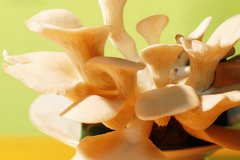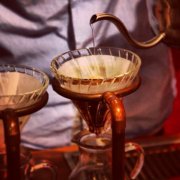Coffee grounds making clothes and shampoo Taiwan manufacturers turn waste into treasure and seek business opportunities
Xingcai successfully converted coffee grounds into clothes made of special fibers through a patented process, which was adopted by large international factories. Picture of Taiwan's United Daily News
According to Taiwan's United Daily News, recycling coffee grounds is a business opportunity from head to toe. Over the past three years, Taiwan has imported more than US $100 million worth of coffee beans every year. According to the statistics of Taiwan's Ministry of Economic Affairs, the number of chain coffee show shops in Taiwan has increased by 20%. With the increase in coffee consumption, about 30,000 kilograms of coffee grounds are produced a day. Taiwanese businessmen are optimistic about the deodorization and germicidal properties of coffee grounds and recycle them into shampoo or functional clothing to focus on the international green market.
Hair salon cosmetics maker Olympus 39 right has worked with research institutes to refine coffee oil from recycled coffee grounds into shampoo, named after "Recoffee".
GE Wangping, general manager of O'Raide, said that 1 liter of Recoffee shampoo per bottle is equivalent to coffee grounds produced by 16 medium cups of Starbucks coffee. The bottle also contains recycled coffee grounds, which can be decomposed in the soil, and coffee seeds are placed at the bottom of the bottle. Under appropriate circumstances, coffee trees can even grow again after use.
Taiwan's long-established textile industry is also an example. Xingcai had revenue of about 1.3 billion NT dollars last year and has always been mainly exported to Europe and the United States. the company director said that the coffee yarn developed is used by more than 100 international well-known brands around the world, such as Patagonia, Timberland, The North Face, Nike and Puma. (end)
Important Notice :
前街咖啡 FrontStreet Coffee has moved to new addredd:
FrontStreet Coffee Address: 315,Donghua East Road,GuangZhou
Tel:020 38364473
- Prev

MuMu CoCo
Coffee grounds, regarded as garbage, have now become fashionable and environmentally friendly products favored by some NGOs, foreign companies and street communities in Shanghai. It is mainly made from recycled coffee grounds and other natural ingredients and can grow mushrooms. If it was simple, how could it attract such attention? Its birth, its planned life journey, and its assigned meaning are all interesting and extraordinary. Mushrooms on coffee grounds
- Next

What are the benefits of drinking coffee?
Does bilirubin of liver disease patient drink coffee energetically? Mr. Shen is a hepatitis B patients, the last time to the hospital for examination, the doctor pointed out that his bilirubin is relatively high, so he needs to pay more attention in life, but Mr. Shen is currently running an online store, need a lot of work every day, at noon every day Hu a little sleepy, so he likes to make a cup of coffee to help themselves
Related
- Detailed explanation of Jadeite planting Land in Panamanian Jadeite Manor introduction to the grading system of Jadeite competitive bidding, Red bid, Green bid and Rose Summer
- Story of Coffee planting in Brenka region of Costa Rica Stonehenge Manor anaerobic heavy honey treatment of flavor mouth
- What's on the barrel of Blue Mountain Coffee beans?
- Can American coffee also pull flowers? How to use hot American style to pull out a good-looking pattern?
- Can you make a cold extract with coffee beans? What is the right proportion for cold-extracted coffee formula?
- Indonesian PWN Gold Mandrine Coffee Origin Features Flavor How to Chong? Mandolin coffee is American.
- A brief introduction to the flavor characteristics of Brazilian yellow bourbon coffee beans
- What is the effect of different water quality on the flavor of cold-extracted coffee? What kind of water is best for brewing coffee?
- Why do you think of Rose Summer whenever you mention Panamanian coffee?
- Introduction to the characteristics of authentic blue mountain coffee bean producing areas? What is the CIB Coffee Authority in Jamaica?

